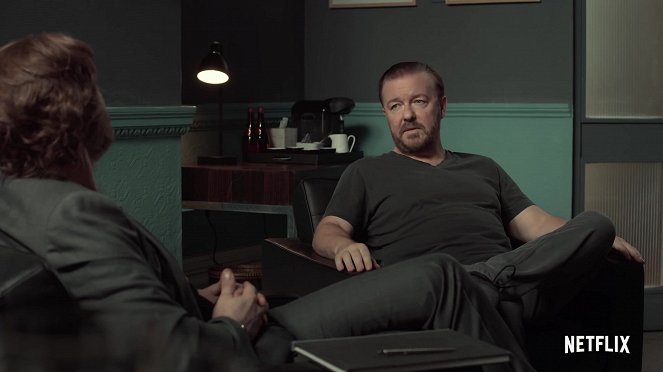Artistes:
Ricky GervaisRéalisation:
Ricky GervaisScénario:
Ricky GervaisPhotographie:
Martin HawkinsMusique:
Andy BurrowsActeurs·trices:
Ricky Gervais, Tom Basden, David Bradley, Roisin Conaty, Kerry Godliman, Ashley Jensen, Paul Kaye, Diane Morgan, Tony Way, Joe Wilkinson (plus)Saisons(3) / Épisodes(18)
Critiques (3)
Being healthy is just dying more slowly. Ricky Gervais seemingly only took his stage alter ego from the last stand-up and placed it to an idyllic small town. But it would soon be too much, not to mention that it would be quite self-centered. However, he was not satisfied with just the controversial and unvarnished humor and the recycling of his favorite topics, which constantly repeats in his standups and podcasts. It mainly deals with (and got the mood right) melancholy, loss, depression and hope. The result is by far the best combination of “bitter comedy" in a long time; I don't remember the last time something was so funny and sadly touching at the same time. It is predictable, but it can touch your “heart" despite the topic. In addition, it makes you laugh a lot, which means that I was often not even able to determine whether I was laughing or crying. Which overshadows the details, that it is somewhat schematic, that all the individual characters meet at the same place during all six episodes, that many of them are just small characters rather than real characters ... Well, I might have mentioned much more. | S1: 4/5 | S2: 4/5 |
()
Season 1 – 85% – The world can sometimes be the worst place to live, everyone knows that, anyone who has ever experienced something not going their way – without it having to be as tragically definitive as with Tony. Even an innocent consumer of unnecessarily loudly crunching crisps can ruin someone's day irreversibly. When Ricky Gervais navigates such a world, never failing in his perpetual grumpiness, it is a done deal. That is why Tony is close to me, both in the feelings of helplessness when the sad emptiness of the surrounding world falls on him, and fortunately in the magical fleeting moments of small joys that make life worth living. Despite the episodic nature of each event and the cautiously constructed coherence, this is more of a three-hour introspection into every corner of the soul. That's why I'm even more surprised that Netflix and Gervais himself want to try to repeat something so elusive in another season. Season 2 – 85% – One could say "more of the same, just in pale blue," but in this specifically dramedic focus (especially as it leans more towards drama), repeating the success deserves twice the praise. The older I get, the rarer it is for a series to move me to tears, and After Life manages to do it with every episode like a wave of a magic wand. Considering how frightened Gervais usually is, his mature confession (accompanied by his own amazing acting performance) is sincere and touching. If it weren't for the vulgar psychiatrist, it would have earned the highest rating as well. Season 3 – 70% – Sometimes, you meet someone with whom you strike up a conversation and immediately know that they have something to say. You may have known or heard a lot of things, but you still hang on their every word because they can give seemingly ordinary things a different name. When you meet them a second time and they strike the same chord, you happily listen to them again because you might have missed something the first time. But when they start talking about the same thing for the third time, you feel like you could have been somewhere else. Or at least talking about something else. In short, Tony's view of the world manages to turn several somersaults over six episodes, even though it started with a state of permanent removal of everything that appears in his surroundings. I am loyal enough that it wouldn't bother me and I would gladly take that walk with him again. But what Brian is doing in the story is beyond me. Just as the annoying psychiatrist disappeared, the local vagrant is brought to the forefront, who not only tells stories full of vulgar nonsense but also keeps coming back with a flood of them. It was because of this walking annoyance that I originally had a lower rating, but I let myself be swayed by the perfect finale, which, by some mystery, never slides into cheap sentimentality and squeezed everything out of me. Even infinite sentimentality can be experienced with masculine detachment.
()
I haven't seen a sadder comedy in a long time. The main character is severely depressed and you don't doubt for a moment that he would like to commit suicide, completely uncomedically, and he even makes several completely uncomedical attempts to do so. His life is just a series of depressing stereotypes interspersed with encounters with the eccentric inhabitants of a small town who will do anything to get in the papers – combing their newborn baby like Hitler, playing two flutes with their noses, making strange rice puddings (not to mention bread)... If Gervais's Tony is lucky in anything, it's that he has a dog and that the others haven't yet broken the stick on him. The answer to the question of whether he hasn't broken the stick, too, may not be surprising in the end, but who cares when it's so pretty to watch.
()

